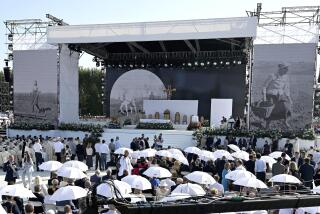Not All Lithuanians Heed Pope’s Call to Forgive : Baltics: He prays at graves of independence martyrs. A slain youth’s parents are still bitter.
- Share via
VILNIUS, Lithuania — On a wooded hillside in the Sunday morning rain, the issue was peace and remembrance. There was the papal view, charitable thoughts and polished phrases. And there was the raw pain of parents whose son lay in one of the cold graves Pope John Paul II had come to bless.
“I desire to pray and to forgive, with renewed faith in the power of love and rejecting the temptation of vengeance which always leads into useless labyrinths of hatred,” said the Pope in a moving cemetery tribute to 18 Lithuanians killed in their country’s successful struggle for independence.
“You cannot forgive murderers--but only murderers,” said 57-year-old Bronislovas Jankauskas. Tears streamed as he stared at the grave of his son Rolandas, 22, who was killed by Soviet troops in Vilnius on Jan. 13, 1991. Jankauskas’ wife stood next to him, shaking her head. She wasn’t forgiving anybody.
John Paul, his platform the physical heart of the bloodstained old Continent, begged the world to learn from the lessons of extremism that so often convulsed it in a savage 20th Century.
“Totalitarianisms of opposite tendencies and unsound democracies have plagued the history of our century,” the Pope complained.
Visiting the former Soviet Union for the first time, John Paul was unsparing in his condemnation of Marxism and the Nazism that preceded it in throttling Lithuania and neighboring Poland, the papal homeland. Yet the Pope also railed against democracies that fall short of their promises.
In a Russian-language greeting to “neighboring Russia,” John Paul applauded efforts there toward “ever more solid freedom and of solidarity, both internally and internationally.” As if to crown the Pope’s long-sought Lithuanian pilgrimage, an emissary arrived bearing best wishes from the Orthodox Patriarch of Moscow, with whose church the Vatican has been feuding in its expansion east.
On the first full day of a weeklong visit to three Baltic republics, John Paul hopscotched across green-and-gray Vilnius, the Lithuanian capital of 600,000.
Before celebrating an open-air Mass for dripping tens of thousands, a somber pontiff, calling himself a “pilgrim of peace and hope,” prayed alone in the drizzle Sunday before a rude wooden cross at Antakalnis Cemetery.
With about 60 relatives arrayed before them, 18 flower-decked graves glistened in the rain. A single candle burned before each marble headstone.
“The Pope’s visit is the greatest honor for our dead, the greatest moral honor for our country,” said Bronislovas Jankauskas. “Independence was worth everything that it took,” he said, eyes never leaving his son’s tomb.
Examining mistakes of the past is a key to a better future, John Paul told Lithuanian intellectuals in an afternoon address at Vilnius University:
“A moment of history must accompany us so that we can treasure the experience of those endless decades in which your country too felt the weight of an iron dictatorship which, in the name of justice and equality, violated the freedom and dignity of individuals and of civil society.”
How could all this have happened? the Pope asked rhetorically, launching one of his most blistering attacks on a communism he helped kill.
“One of the more important reasons,” John Paul said, “was the militant atheism that gave Marxism its inspiration: an atheism offensive to man too, which destroyed the basis of his dignity and its firmest guarantee.”
The enslavement by Marxism was not the only tragedy to strike the Old World in a destructive century, the Pope argued.
“One should judge no less seriously what took place on the opposite side, the ‘right-wing’ regimes that . . . likewise scorned that dignity which is proper to every human being, regardless of race, conviction and personal qualities. How can we forget . . . the monstrous violence caused by Nazism, especially toward the Jewish people, offered as a holocaust in the name of a supposed racial primacy and an insane plan of domination?”
More to Read
Sign up for Essential California
The most important California stories and recommendations in your inbox every morning.
You may occasionally receive promotional content from the Los Angeles Times.













